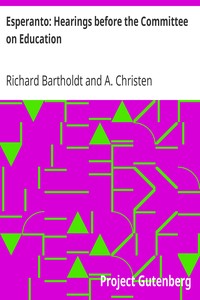Esperanto: Hearings before the Committee on Education by Bartholdt and Christen
"Esperanto: Hearings before the Committee on Education" by Bartholdt and Christen is a historical account written in the early 20th century. The document details the hearings held by the Committee on Education in the House of Representatives regarding the proposal to study Esperanto as an auxiliary language in schools. The primary topic addressed is the practicality and potential benefits of introducing Esperanto to foster international communication and improve language learning. In the
hearings, Hon. Richard Bartholdt advocates for teaching Esperanto, arguing that it could easily replace the necessity of learning multiple foreign languages for American students. He emphasizes the simplicity of Esperanto compared to other languages, highlighting how it can help create equal footing among speakers of different native languages. Prof. A. Christen supports this view, providing insights into the linguistic chaos caused by numerous languages and asserting that Esperanto's structured simplicity makes it ideal for global communication. The testimonies underscore the growing international interest in Esperanto and its practical applications in commerce, education, and diplomatic relations as a neutral language for all nations. (This is an automatically generated summary.)
Read or download for free
| How to read | Url | Size | |||
|---|---|---|---|---|---|
| Read now! | https://www.gutenberg.org/ebooks/16432.html.images | 101 kB | |||
| EPUB3 (E-readers incl. Send-to-Kindle) | https://www.gutenberg.org/ebooks/16432.epub3.images | 124 kB | |||
| EPUB (older E-readers) | https://www.gutenberg.org/ebooks/16432.epub.images | 123 kB | |||
| EPUB (no images, older E-readers) | https://www.gutenberg.org/ebooks/16432.epub.noimages | 92 kB | |||
| Kindle | https://www.gutenberg.org/ebooks/16432.kf8.images | 310 kB | |||
| older Kindles | https://www.gutenberg.org/ebooks/16432.kindle.images | 300 kB | |||
| Plain Text UTF-8 | https://www.gutenberg.org/ebooks/16432.txt.utf-8 | 85 kB | |||
| Download HTML (zip) | https://www.gutenberg.org/cache/epub/16432/pg16432-h.zip | 122 kB | |||
| There may be more files related to this item. | |||||
Similar Books
About this eBook
| Author | Bartholdt, Richard, 1855-1932 |
|---|---|
| Author | Christen, A. |
| Title | Esperanto: Hearings before the Committee on Education |
| Credits |
Produced by David Starner, William Patterson and the Online Distributed Proofreading Team at www.pgdp.net |
| Reading Level | Reading ease score: 57.0 (10th to 12th grade). Somewhat difficult to read. |
| Language | English |
| LoC Class | PM: Language and Literatures: Indigenous American and Artificial Languages |
| Subject | Esperanto |
| Category | Text |
| EBook-No. | 16432 |
| Release Date | Aug 4, 2005 |
| Most Recently Updated | Dec 12, 2020 |
| Copyright Status | Public domain in the USA. |
| Downloads | 198 downloads in the last 30 days. |
| Project Gutenberg eBooks are always free! | |

